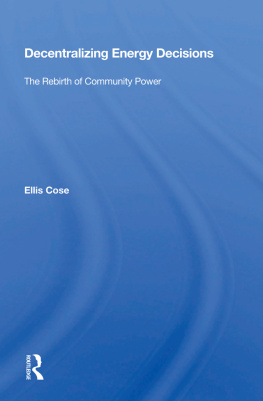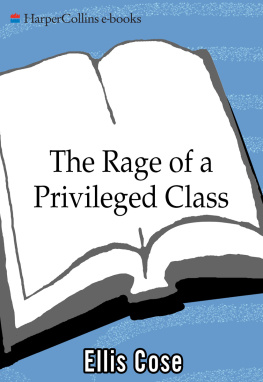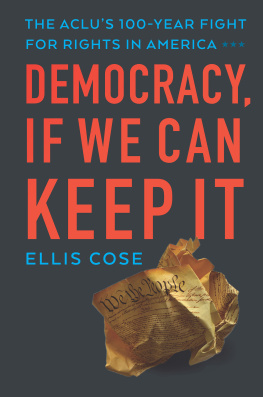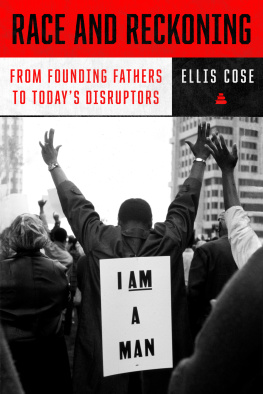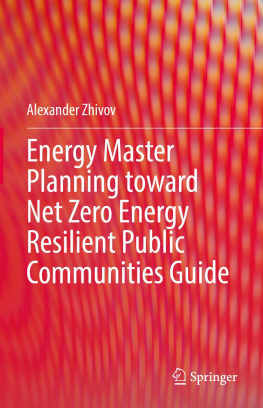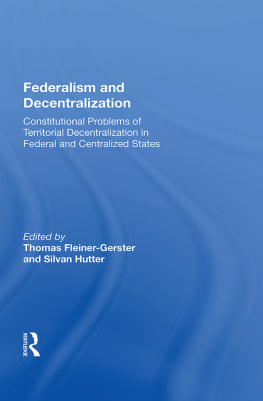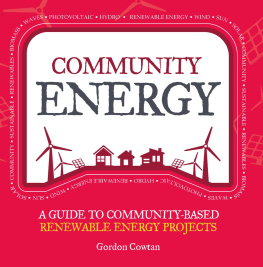Decentralizing Energy Decisions
Westview Replica Editions
The concept of Westview Replica Editions is a response to the continuing crisis in academic and informational publishing. Library budgets for books have been severely curtailed. Ever larger portions of general library budgets are being diverted from the purchase of books and used for data banks, computers, micromedia, and other methods of information retrieval. Interlibrary loan structures further reduce the edition sizes required to satisfy the needs of the scholarly community. Economic pressures on the university presses and the few private scholarly publishing companies have severely limited the capacity of the industry to properly serve the academic and research communities. As a result, many manuscripts dealing with important subjects, often representing the highest level of scholarship, are no longer economically viable publishing projectsor, if accepted for publication, are typically subject to lead times ranging from one to three years.
Westview Replica Editions are our practical solution to the problem. We accept a manuscript in camera-ready form, typed according to our specifications, and move it immediately into the production process. As always, the selection criteria include the importance of the subject, the work's contribution to scholarship, and its insight, originality of thought, and excellence of exposition. The responsibility for editing and proofreading lies with the author or sponsoring institution. We prepare chapter headings and display pages, file for copyright, and obtain Library of Congress Cataloging in Publication Data. A detailed manual contains simple instructions for preparing the final typescript, and our editorial staff is always available to answer questions.
The end result is a book printed on acid-free paper and bound in sturdy library-quality soft covers. We manufacture these books ourselves using equipment that does not require a lengthy make-ready process and that allows us to publish first editions of 300 to 600 copies and to reprint even smaller quantities as needed. Thus, we can produce Replica Editions quickly and can keep even very specialized books in print as long as there is a demand for them.
About the Book and Author
Decentralizing Energy Decisions:
The Rebirth of Community Power
Ellis Cose
Decision making about energy has come to epitomize a larger struggle taking place in U.S. society--a struggle for control over individual destiny, economic resources, and the shaping of society itself. A host of ideologies has been spawned, new federalism and new populism among them. Many activist groups argue that making decisions about resources can be a first step in helping people gain control of their lives.
Focusing on the issues surrounding the control of energy and discussing the limitations and advantages of dealing with the energy problem at the local level, the author examines the proposition that granting control over decision making to cities, states, or regions rather than to the federal government can positively affect public confidence, as well as result in more efficient energy planning. Mr. Cose discusses the various interpretations of decentralization; the relationship between decentralization and small-scale technologies; the overlapping and opposing interests of governments, consumers, and corporations; and the extent to which local governments and political structures are prepared to deal with an issue that is traditionally outside of their sphere.
The author supports his analysis by looking at specific municipal governments and their attempts, successes, and failures to respond to the energy crisis. He also analyzes the particular problems of community projects. Throughout the book he comments on the effect that Reagan administration policies have had on decision making about energy at all levels of government nationwide.
Previously a journalist with the Chicago Sun Times, the Detroit Free Press, and USA Today, Mr. Cose holds an M .A. in science, technology, and public policy from George Washington University and is currently president of the Institute for Journalism Education at the University of California, Berkeley. He is the author of Energy and the Urban Crisis and the editor of Energy and Equity: Some Social Concerns.
Decentralizing Energy Decisions
The Rebirth of Community Power
Ellis Cose
First published 1983 by Westview Press
Published 2018 by Routledge
52 Vanderbilt Avenue, New York, NY 10017
2 Park Square, Milton Park, Abingdon, Oxon OX14 4RN
Routledge is an imprint of the Taylor & Francis Group, an informa business
Copyright 1983 by Taylor & Francis
All rights reserved. No part of this book may be reprinted or reproduced or utilised in any form or by any electronic, mechanical, or other means, now known or hereafter invented, including photocopying and recording, or in any information storage or retrieval system, without permission in writing from the publishers.
Notice:
Product or corporate names may be trademarks or registered trademarks, and are used only for identification and explanation without intent to infringe.
Library of Congress Cataloging in Publication Data
Cose, Ellis.
Decentralizing energy decisions.
(A Westview replica edition)
1. Energy policy--United States--Citizen participation.
2. Decentralization in government--United States. 3. Local
government--United States. I. Title.
HD9502.U52C6839 1983 333.79'0973 83-14686
ISBN 13: 978-0-367-01713-2(hbk)
Contents
- CHAPTER 1
THE NEW REALITY - CHAPTER 2
ENERGY ACTIONS - CHAPTER 3
CITIES AND CRISES - CHAPTER 4
REDISTRIBUTING RESPONSIBILITY - CHAPTER 5
NATIONAL WELFARE - CHAPTER 6
PRIVATE INTERESTS - CHAPTER 7
CITIES, STATES, AND CONFLICT - CHAPTER 8
EMPOWERING COMMUNITIES - CHAPTER 9
BEYOND BEGINNINGS
- CHAPTER 1
THE NEW REALITY - CHAPTER 2
ENERGY ACTIONS - CHAPTER 3
CITIES AND CRISES - CHAPTER 4
REDISTRIBUTING RESPONSIBILITY - CHAPTER 5
NATIONAL WELFARE - CHAPTER 6
PRIVATE INTERESTS - CHAPTER 7
CITIES, STATES, AND CONFLICT - CHAPTER 8
EMPOWERING COMMUNITIES - CHAPTER 9
BEYOND BEGINNINGS
Guide
A book is nearly always a group effort. Decentralizing Energy Decisions is no exception. I am indebted first of all to the Ford Foundation, the Andrew Mellon Foundation and the National Research Council-National Academy of Sciences. Without financial support from the above-mentioned foundations, this project never would have been undertaken. Without the institutional home provided by the National Research Council, it could not have been completed.
The list of individuals essential to this project is much too long to reproduce here. None, however, were more critical than the scores of local officials, in cities across the nation, who gave freely of their time and intellectual resources.
The members of the National Academy of Sciences' Committee on the Behavioral and Social Aspects of Energy Consumption were another invaluable intellectual resource. Thomas Wilbanks, a member of that committee and associate director at Oak Ridge National Laboratory, was especially helpful, balancing the difficult roles of critic, supporter, and friend. Paul Stern, staff director for the committee, and Richard Hofrichter, his research associate, played the same balancing act and have my gratitude as a result.

